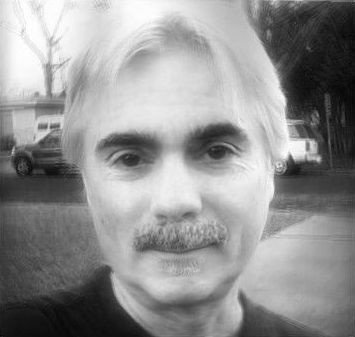Stepping Out from the Shadow of the Father
by Rick Belden
I recently had the pleasure of corresponding a bit with Dr. John Ashfield, an Australian author, educator, and psychotherapist. Dr. Ashfield is Director of Education and Clinical Practice for the Australian Institute of Male Health and Studies, and is the author of the recently published book Doing Psychotherapy with Men: Practicing Ethical Psychotherapy and Counselling with Men.
In a chapter called “Being Your Own Man” from his previous book, Matters for Men: Staying Healthy and Keeping Life on Track, Dr. Ashfield wrote:
Father and son relationships are often fraught with tension and conflict, because of a failure to understand that a son must chart his own course, and must best his father in some way, in order to become a self-respecting equal with him in the world of men. Sons must not only be snatched away from mother’s apron strings, but must also decisively cease their dependence on or acquiescence to father. Many men, even in middle age, experience the continuing inertia of unrealized manhood because they are still preoccupied – often unknowingly, with lamenting an absent (or less than ideal) father, or living in their father’s shadow. There may be no simple formula for success in life, but there is a simple formula for failure: to betray and abandon the person we could become, and the life that we could have, in order to placate and please other people.
The decision to be ourselves and to be responsible for ourselves – to shape our own destiny, rather than living on the leftovers of someone else’s, is no small matter. It can be a frightening thing to take the first few steps into a future governed by our own volition and choices. But no other option can give us the dignity or manliness of a life that is, for better or for worse, uniquely and satisfyingly ours and ours alone.
Dr. Ashfield’s comments remind me of one of my favorite quotes, attibuted to Rudyard Kipling:
“To be your own man is a hard business. If you try it, you will be lonely often, and sometimes frightened. But no price is too high to pay for the privilege of owning yourself.”
I’ve found, as Dr. Ashfield has written, that separating from my father, from both the man he was and the man I needed him to be, has been crucial to my coming into my own life as a mature man. It’s been a long process, a “hard business” as Kipling put it. It’s also been both necessary and well worth the time and the effort. I know there’s more work to do (there will always be more), but nearly 35 years after taking my first conscious steps out of my father’s life and into my own, I’m finally beginning to feel, in ways I never have before, that I am becoming a man at last.
Still I am, as Kipling said, “lonely often, and sometimes frightened,” frequently more so than I would prefer or care to admit, but I also have a tolerance and an acceptance of both of these states that I didn’t have even a few years ago. I understand now that standing up as a man in this world doesn’t guarantee me anything – not love, not success, not companionship, not fidelity, not health, not safety – and this understanding has liberated me, not from wanting all of those things, but from expecting them as some sort of reward for doing what I believe is right.
It is only by standing firm in my own authenticity and integrity that I can truly be fully present in this world and in my own life, with all of the inevitable pain, confusion, and disappointment that come to each one of us who lives. This is a lesson my father could not teach me, having never learned it himself, and I could only learn it by stepping out from the long, angry shadow he cast over my life as a child, a shadow that covered me like a second skin and nearly obliterated my life as a man.
– is a deeply personal issue that everyone decides for himself. Sometimes the price is high, sometimes low. But this is not very important for life. Life is an interesting thing. And the price on Viagra – too.


